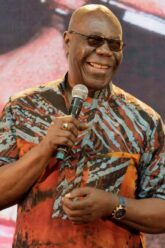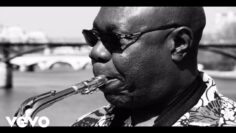Manu Dibango, nicknamed Papa Groove, is a Cameroonian saxophonist and singer of world jazz born on December 12, 1933 in Douala (Cameroon) and died on March 24, 2020 in Melun, France.
In the spring of 1949, he arrived in Marseille, where he was welcomed by his “pen pal” Mr. Chevallier, a severe teacher from Saint-Calais. He spent his adolescence with a host family in this commune of the Sarthe region and discovered French culture. His autobiography Trois kilos de café (Three Kilos of Coffee) recalls that he arrived with 3 kilos of coffee in his bag, a rare and expensive commodity at the time, to pay for his first months of boarding school. Then, as a student in Chartres, then in Château-Thierry in the early 1950s, he discovered jazz, played the mandolin and learned to play the piano.
During a stay in a camp center reserved for Cameroonian children living in France in Saint-Hilaire-du-Harcouët, he discovered the saxophone borrowed from his friend Moyébé Ndédi and met Francis Bebey. Bebey taught him the basics of jazz and they formed a small group playing this music; but it was in Reims, where he was preparing for his baccalaureate in philosophy, that he was introduced to the saxophone and began to perform in “clubs” and country dances.
In 1972, the B side of a 45 rpm, Soul Makossa, is sampled on Wanna Be Starting Something by Michael Jackson.
In the 1980s, Manu Dibango found a financial agreement with Michael Jackson for the use of his song in the album Thriller, but the latter later allowed Rihanna to use Dibango’s music for the track Don’t Stop the Music. The song Soul Makossa conquered the United States and led to a tour there. Its African accents fascinated black musicians from both North and South America.
On February 3, 2009, Manu Dibango decided to sue Michael Jackson and Rihanna’s record companies (Sony BMG, Warner and EMI) for having used the theme of Soul Makossa without authorization. The court gave its decision on February 17, 2009 by rejecting the form of the Cameroonian singer. Finally, the procedure ends with an out-of-court financial settlement.







